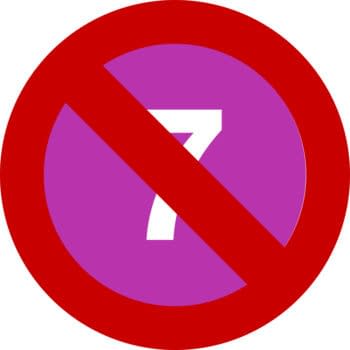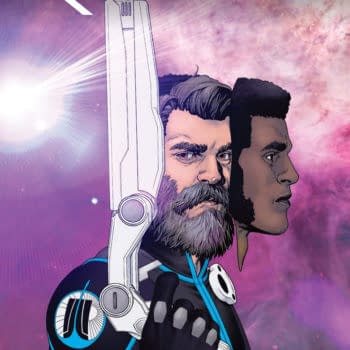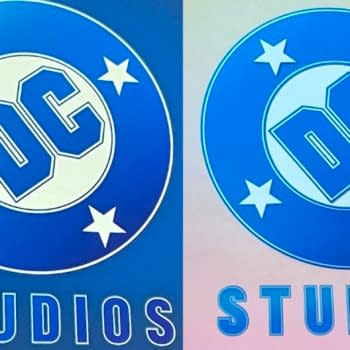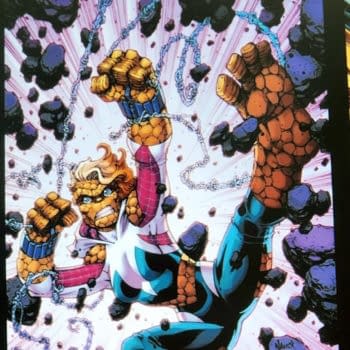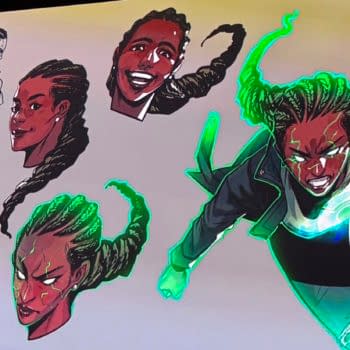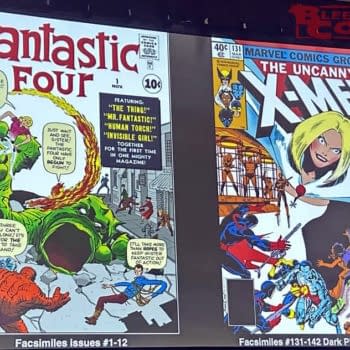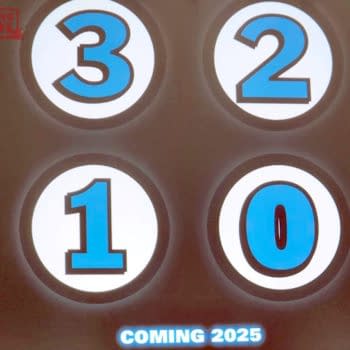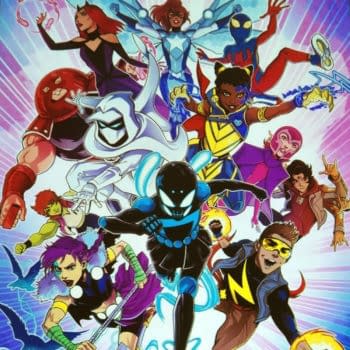Posted in: Comics, Conventions, WonderCon | Tagged: American dream, Andrew Barton, Beach City, Comics, female characters, Gems, gemstones, gender-swapping, hamlet, juliet, Karma Waltonen, kill shakespeare, Lady Macbeth, lgbt, lgbt community, marvel, metaphor, Michael Lee Gonzales, otherness, panel, queer, queer comics, queer community, queer theory, Queering Comics, Roland Barthes, Steven Universe, the American dream, the other, The Vision, Tom King, vision, white-picket fence, wondercon
Outside WonderCon's White Picket Fence: LGBT Takes on Kill Shakespeare, Vision, and Steven Universe
Emilie Badaboom writes for Bleeding Cool
At at Queering Comics panel, panelists presented scholarly dialogue presenting their reviews of various comic universes stories as they relate to queer theory. The panel included commentary on Kill Shakespeare by Karma Waltonen, The Vision by Andrew Barton, and on Steven Universe's comics and show by Michael Lee Gonzales.
The reviews only took up a small portion of the panel, with a large amount of time devoted to questions and open conversation between attendees and panelists. Conversations strayed from inquiring about the presentations to asking generic questions about the comic book industry and what we in the lgbt community want.
Waltonen, leading the panel and question portion, spoke on Kill Shakespeare and the relation of the female characters such as Juliet and Lady Macbeth to the 'protagonist' of the story Hamlet without relying on the male lead for comparison. Sex, seduction, gender, and empowerment were common themes while discussing the female trope.
The Vision, the 12 part one-shot, has often been referred to as Marvel's dark answer to The Watchmen. Internalizing the prose of 'separate from the norm', 
Gonzales discussed the hit cartoon-turned comic universe of 'Steven Universe', commenting on the panel and cartoon's focus on commodity and pleasure. He proposed the use of the comics to break outside the literal panels with thought bubbles 'thinking outside the box' and 'breaking the mold'. He also spoke on the 'naturality' of gemstones relationships with one another. He argued Gems in the show had an organic relationships together without judgement as naturally as gemstones are found on earth. He also discussed the 'Steven Chewiverse', in which Steven has to choose between a hot dog or bagel.. And instead of choosing one over the other or having both separately he chose to combine them and enjoy both simultaneously, embracing the pleasure of both.

During the last half of the panel, questions were presented to the panelists regarding their interpretations and the potential of 'possibly reading too deeply into the original intent of the authors'. Barton quickly agreed, and paraphrased Roland Barthes. Once an author creates a piece it's out for interpretation and internalization, and Barton confirmed he may have read more into the Vision than Tom King intended. Even down to reading a panel of Vision flying away silhouetted as a distinguished mark of separating himself from the 'American dream prose' and embracing his 'otherness'.
Several SU fans commented on Gonzales take during the question portion of the color use and critique of Beach City (the primary location in Steven Universe), where no one goes to school, all you eat are the fry bits, and the senses are pleasured at every turn. Although someone in the audience questioned his interpretation of the color schemes and splash boards as being a hedonic 'where's waldo' a little too skewed, several attendees nodded silently in agreement as he discussed his own stepping into comics through the cartoon network show and his comparison of art designs. Although both cartoon and comic have an optimistic 'cute' theme, there are differences between the more sensual tones of the comic.
Waltonen discussed Marvel's recent announcement of plans on cutting down gender-swapping characters due to them not selling comics. She brought up how comics as a medium need to be expanded and balanced; embracing new characters and changes to the fan favorites. She and Barton spoke on the dichotomy of giving prevalence to new readers versus the old fans, and why it's hard for comics to reel in new fans with the 'same old' story and still keep current readers happy.

Panelists were also questioned on what they wanted to see in comics, and what comic book publishers can do to better represent the queer community. It was mentioned that Boom! Comics, who publish KaBoom!, could embrace the gay characters and themes on a larger scope with larger publishing names. Steven Universe, which has already broken the mold on Cartoon Network by embracing LGBT relations, should continue to make the strides they have been with same-sex couples and gender neutrality.
One of the most striking parts of the panel to me was when Barton touched on the use of the metaphor in larger context in mainstream comics. Larger publishers such as Marvel and DC have the audience to create real-life relatable situations and instead choose to make their statements through metaphors. The LGBT community as well as other marginalized 'others' want and need to see their stories told as they are and not through metaphor. Although they make for a compelling wide-spectrum story, the use of metaphor over an actual modern-day struggle can dilute the impact on the reader and continue to shadow real problems those behind the white picket fence just don't understand.
Eliot – I'm to blame for the delay in publishing this, sorry folks.






